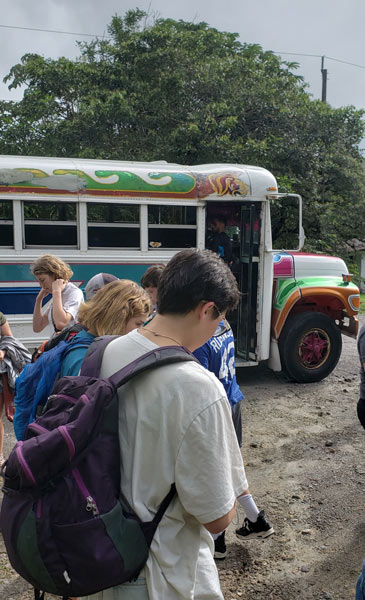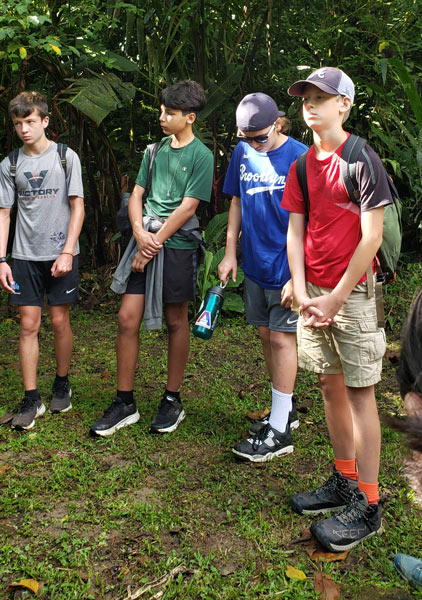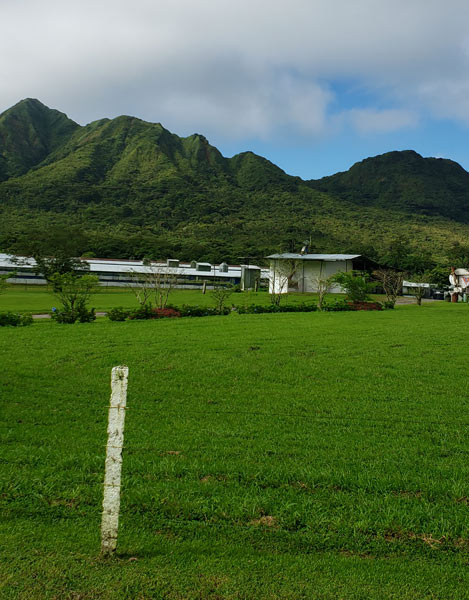By Penelope B., Tamar L., Stella G., and Ineva L.
Over the past few days, we, the AMIGOS volunteers, have had our introduction to the food, people, and culture of Panama. Although there is still so much to learn, we have attempted to fully immerse ourselves in the mannerisms and traditions of the Panamanian people. Throughout this, however, we have also been sure to have discussions about cultural sensitivity, cultural norms, and the idea of “white saviors.”
In the AMIGOS program, a huge part of the experience is supporting small communities and businesses. Nonetheless, there is a thin line between giving help that is wanted and imposing ourselves on un-wanting communities. We read an extremely interesting article, “To Hell With Good Intentions” by Ivan Illich, that brought about thoughts and discussions regarding American imperialism, intention vs. outcome, and the downsides of service project (such as this one) in general.
One thing we talked about was how no matter if it’s subconscious or not, we as privileged Americans automatically see other “less developed” communities as ones in need of assistance or saving. We have grown up believing that our middle-class, luxurious life is the “American Dream.” This can result in the imposition of our culture and our life when that imposition is unwanted and unnecessary. For example, we cannot un-board a flight across the country and expect to know how best to serve the community there.
 It is critical that we respect local people’s traditions, culture, and general lifestyle before we barge in, plant ourselves in the middle of their already established society, and attempt to “fix” it. None of the communities need fixing. None of them need to be developed. There are plenty of people out there who are happy with their life, and that life may look drastically different than the one we envision as “good.” That life may be drastically different than the one we have deemed as “successful” or “happy.”
It is critical that we respect local people’s traditions, culture, and general lifestyle before we barge in, plant ourselves in the middle of their already established society, and attempt to “fix” it. None of the communities need fixing. None of them need to be developed. There are plenty of people out there who are happy with their life, and that life may look drastically different than the one we envision as “good.” That life may be drastically different than the one we have deemed as “successful” or “happy.”
Even if cannot automatically flip a switch to change our subconscious perspective, what we can do is slowly try to work around it. We ask before doing. We only go to help at places we have been invited to. We attempt to not only respect the people’s values and customs but live by them as well. By living by them, we hope to not use it as an act or an experiment, but rather as an attempt to realize that all communities, not just our own, can thrive and be happy. Now let’s talk about an amazing excursion to Cerro Gaital.
This week, our group went on the second excursion of the trip to Cerro Gaital, the mountain that looms over El Valle de Anton. At 8:00 am, the group hopped onto a bus and started on the windy journey to the start of the hike. On the way, we blasted beats and saw the colorful houses on the sides of the road.
We met our guide, Jose, at the start of the hike, and he began to lead us up the mountain. He answered the many questions we asked and informed us that no, there weren’t monkeys in the forest because they didn’t like the moss on the trees. We learned about how the volcanoes created Central America, and how we were 1,000 meters above sea level. The hike was steep and slippery, but we reached the top quickly and were able to see the beautiful view of the crater. We could even spot our lodging site, surrounded by a lush forest. On the way down, we stopped at an orchid station where orchids from the orchid garden that we had worked at the two days before were planted. When we finally reached the start of the hike, we broke into pairs to plant tree saplings along the road.
 After we had safely put the baby plants into the ground, we hopped back onto the bus. But the excursion was not over yet. We stopped at an outdoor market where the group bought all types of Panamanian candies, fruits, snacks, and souvenirs for their family. Finally, the group returned to the lodging site where they created their own “snack shops” and traded their goods.
After we had safely put the baby plants into the ground, we hopped back onto the bus. But the excursion was not over yet. We stopped at an outdoor market where the group bought all types of Panamanian candies, fruits, snacks, and souvenirs for their family. Finally, the group returned to the lodging site where they created their own “snack shops” and traded their goods.
It was exciting to see the orchids from the garden that we were able to support with our work flourish in nature, and plant trees that would serve the environment for many years to come. After this excursion, the volunteers can’t wait to do more service work and explore the beauty of Panama!
En los últimos días, nosotros, los voluntarios de AMIGOS, hemos tenido nuestra introducción a la comida, la gente y la cultura de Panamá. Aunque todavía hay mucho que aprender, hemos intentado sumergirnos por completo en las costumbres y tradiciones del pueblo panameño. A lo largo de esto, sin embargo, también nos hemos asegurado de tener discusiones sobre la sensibilidad cultural, las normas culturales y la idea de los “salvadores blancos”.
En el programa AMIGOS, una gran parte de la experiencia es ayudar a pequeñas comunidades y negocios. No obstante, existe una delgada línea entre brindar la ayuda que se desea e imponernos a las comunidades que no la desean. Leímos un artículo extremadamente interesante, “Al infierno con las buenas intenciones” de Ivan Illich, que generó pensamientos y discusiones sobre el imperialismo estadounidense, la intención frente al resultado y las desventajas del proyecto de servicio (como este) en general.
Una cosa de la que hablamos fue cómo, sin importar si es subconsciente o no, nosotros, como estadounidenses privilegiados, automáticamente vemos a otras comunidades “menos desarrolladas” como aquellas que necesitan ayuda o ser salvadas. Hemos crecido creyendo que nuestra vida lujosa de clase media es el “sueño americano”. Esto puede resultar en la imposición de nuestra cultura y nuestra vida cuando esa imposición es indeseable e innecesaria. Por ejemplo, no podemos desembarcar en un vuelo en un país y esperar saber cuál es la mejor manera de servir a la comunidad allí.
Es fundamental que respetemos las tradiciones, la cultura y el estilo de vida de la población local antes de irrumpir, plantarnos en medio de su sociedad ya establecida e intentar “arreglarla”. Ninguno de los complejos necesita arreglos. Ninguno de ellos necesita ser desarrollado. Hay muchas personas que están felices con su vida, y esa vida puede verse drásticamente diferente de la que imaginamos como “buena”. Esa vida puede ser drásticamente diferente a la que hemos considerado como “exitosa” o “feliz”.
Incluso si no podemos accionar automáticamente un interruptor para cambiar nuestra perspectiva, lo que podemos hacer es tratar de solucionarlo lentamente. Preguntamos antes de hacer. Solo vamos a ayudar a los lugares a los que nos han invitado. Intentamos no solo respetar los valores y costumbres de las personas, sino también vivir de acuerdo con ellos. Al vivir de acuerdo con ellos, esperamos no usarlo como un acto o un experimento, sino como un intento de darnos cuenta de que todas las comunidades, no solo la nuestra, pueden prosperar y ser felices.
 Ahora hablemos de la increíble excursión al Cerro Gaital. Esta semana, nuestro grupo realizó la segunda excursión del viaje al Cerro Gaital, la montaña que se cierne sobre El Valle de Antón. A las 8:00 a. m., el grupo se subió a un autobús que había sido bus de escuela en un pasado y comenzó el viaje hasta el comienzo de la caminata. En el camino, escuchamos ritmos latinos y vimos casas coloridas a los lados de la carretera.
Ahora hablemos de la increíble excursión al Cerro Gaital. Esta semana, nuestro grupo realizó la segunda excursión del viaje al Cerro Gaital, la montaña que se cierne sobre El Valle de Antón. A las 8:00 a. m., el grupo se subió a un autobús que había sido bus de escuela en un pasado y comenzó el viaje hasta el comienzo de la caminata. En el camino, escuchamos ritmos latinos y vimos casas coloridas a los lados de la carretera.
Conocimos al guía, José, al comienzo de la caminata, donde comenzó a llevarnos a la montaña. Respondió a las muchas preguntas que le hicimos y nos informó que no, que no había monos en el bosque porque no les gustaba el musgo de los árboles. Aprendimos sobre cómo los volcanes crearon América Central y cómo estábamos a 1,000 metros sobre el nivel del mar. La caminata fue empinada y resbaladiza, pero llegamos a la cima rápidamente y pudimos ver la hermosa vista del cráter. Incluso pudimos divisar nuestro sitio de hospedaje, rodeado por un frondoso bosque. En el camino hacia abajo, nos detuvimos en una estación de orquídeas donde se plantaron orquídeas del jardín de orquídeas en el que habíamos trabajado los dos días anteriores. Cuando finalmente llegamos al comienzo de la caminata, nos dividimos en parejas para plantar árboles a lo largo del camino.
Después de plantar dichos árboles en el suelo de forma segura, volvimos a subir al autobús. Pero la excursión aún no había terminado. Nos detuvimos en un mercado al aire libre donde el grupo compró todo tipo de dulces, frutas, bocadillos y recuerdos panameños para su familia. Finalmente, el grupo regresó al sitio de alojamiento donde crearon sus propias “tiendas de refrigerios” e intercambiaron sus productos.
Fue emocionante ver las orquídeas del jardín que pudimos apoyar con nuestro trabajo florecer en la naturaleza y plantar árboles que serviran al medio ambiente durante muchos años. ¡Después de esta excursión, los voluntarios están ansiosos por hacer más trabajo de servicio y explorar la belleza de Panamá!

